According to the latest Night Time Economy Market Monitor, the UK’s late-night economy has contracted by 4.6% over the last year driven by rising costs, safety concerns and unreliable late-night transport putting customers off bars and clubs.
The analysis from CGA by NIQ and the Night Time Industries association also reveals a 28% decline in the industry since March 2020 when a wave of closures was triggered by the Covid-19 pandemic.
Data from the CGA RSM Hospitality Business Tracker in September further demonstrates the fall in late night spending with figures showing a 2.5% year-on-year growth for drink-led pubs but a steep decline of 6.8% for bars, which tend to operate later into the night.
The Night Time Economy Market Monitor also found that 24% of customers consider security when planning to go out to late night venues and 28% consider transport home, causing earlier entries and leaving bars and clubs emptier after midnight.
Earlier this year, research by leading hospitality provider Zonal and CGA by NIQ revealed that 6.12pm had become the average preferred start time for a dinner reservation as opposed to what was the traditionally most popular 8pm slot.
The survey of 5,000 British adults found that while 2024 saw 46% of bookings between 12 and 6pm, the first quarter of 2025 had a rise to 48% and only 2% of bookings were being made for after 9pm.
Reasons behind the shift included 37% of participants saying they were going out earlier due to convenience, 22% for ease of booking, 16% for shorter waiting times and as similarly spotlighted in the recent data, 18% of people were driven by better public transport options.
The recent surge in closures is a result of the culmination of a growing change to consumer habits and rising operational costs and has left the sector calling for Government help.
“For too long, government policies have suppressed a vital part of Britain’s cultural and social life. The late-night economy is an engine for jobs, tourism and community vibrancy, but it is being systematically squeezed,” says Mike Kill, CEO of the Night Time Industries Association.
“Rising costs, safety fears and unreliable late-night transport are creating barriers to spending and closing doors. The Budget is a chance to reverse this trend and recognise the late-night sector as the cultural and economic powerhouse it truly is.”
Reuben Pullan, CGA by NIQ’s senior insight consultant, adds: “These numbers are more proof of the huge pressures facing late-night businesses.
“While many have responded well to seismic changes and challenges, others, especially smaller operators, have found it impossible to recover from COVID and its aftershocks. Consumers remain eager to go out, and demand for hospitality experiences is changing rather than collapsing.
“Christmas and New Year trading will bring a much-needed boost, but we’re likely to see more closures into 2026 unless the late-night economy gets the support from central and local government that it deserves.”

